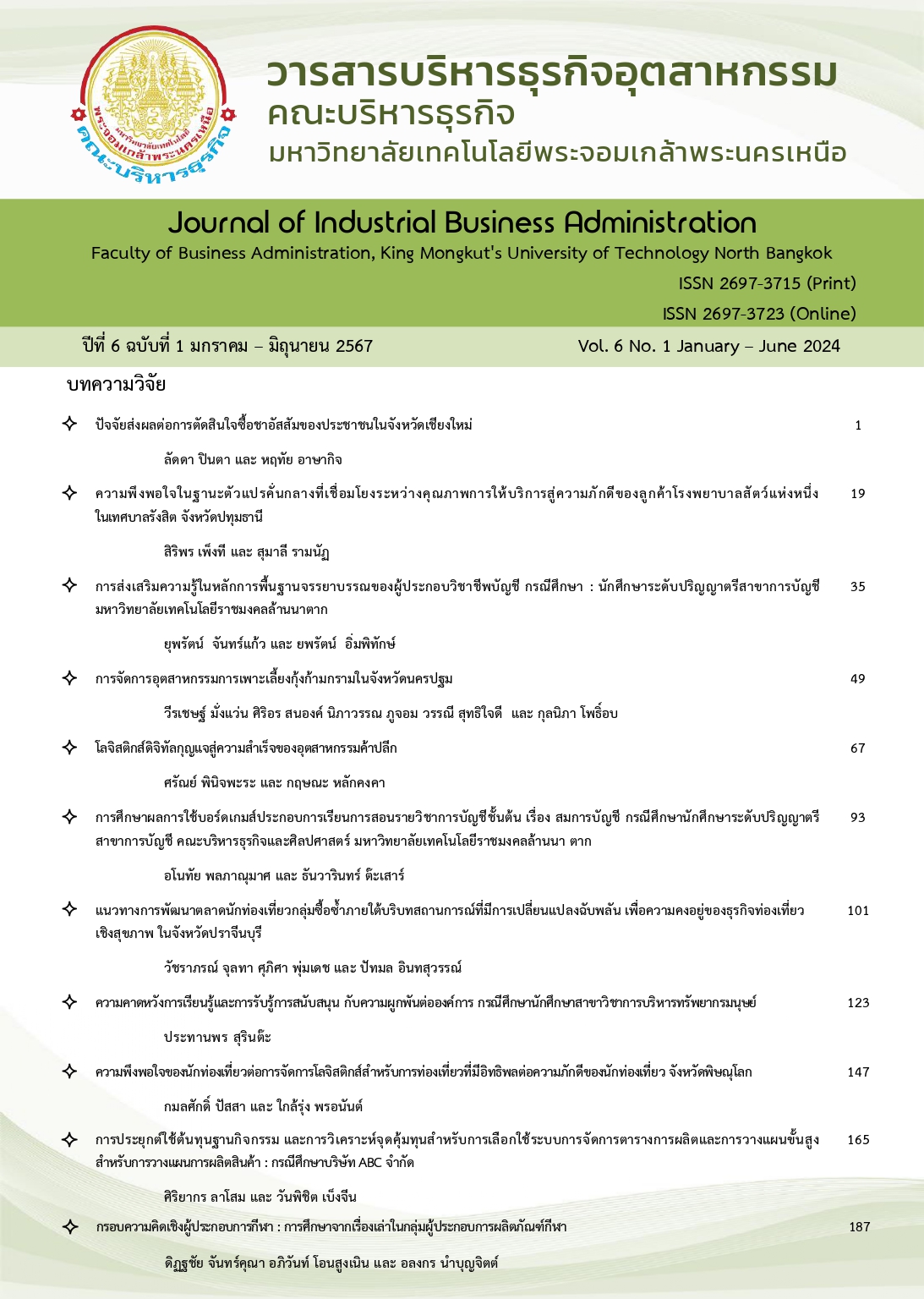Learning Expectation, Perceived Organizational Support and Organizational Commitment among Students Majoring in Human Resource Management
Keywords:
Learning Expectation, Perceived Organizational Support, Organizational CommitmentAbstract
The aim of this research was to: (1) study the relationships between learning expectation and perceived organizational support and organizational commitment among students majoring in human resource management; and (2) study the predictability of learning expectation and perceived
organizational support and organizational commitment among students majoring in human resource management. The sample size was 109 students majoring in human resource management. The research instruments consisted of a learning expectation questionnaire, a survey of organizational support, and an organizational commitment scale. The data were analyzed using Pearson’s product moment correlation coefficient and multiple regression. The results were as follows: 1. Learning expectations and perceived organizational support had a significantly positive relationship with organizational commitment (r =.436 and.443, respectively, p<.01). 2. Learning expectations and perceived organizational support could significantly predict turnover intention (p<.01). Both variables explained the 26.70 percent variance in turnover intention.
References
Aggarwal-Gupta, M., Vohra, N., & Bhatnagar, D. (2010). Perceived Organizational Support and Organizational Commitment: The Mediational Influence of Psychological Well-Being.
Journal of Business and Management, 16(2), 105-124. https://www.proquest.com/docview/847845672?parentSessionId = w84gK1iuPIeCpJJvgL8uEQzHGDfweXE8WCOX3
grvgHA%3D&sourcetype=Scholarly%20Journals
Allen, N. J., & Meyer, J. P. (1990). The measurement and antecedents of affective, continuance and normative commitment to the organization. Journal of occupational Psychology,6(3), 1-18.https://doi.org/10.1111/j.2044-8325.1990.tb00506.x
Buchanan, H. B. (1974). building organization commitment the socialization of managers in work organization. Administrative Science Quarterly, 19(4), 533 - 546.https://doi.org/10.2307/2391809
Currie, P., & Dollery, B. (2006). Organizational commitment and perceived organizational support in the NSW police. An International Journal of Police Strategies and
Management, 29(4), 741-756. https://doi.org/10.1108/13639510610711637
Eisenberger, R., Cummings, J., Armeli, S., & Lynch, P. (1997). Perceived organizational support,discretionary treatment, and job satisfaction. Journal of Applied Psychology, 82(5), 812-820.
Eisenberger, R., Huntington, R., Hutchison. S., & Sowa, D. (1986). Perceived Support. Journal of Applied Psychology, 3(71), 500-507. https://doi.org/10.1037/0021- 9010.71.3.500
Hinkle, D.E. (1998). Applied Statistics for the Behavioral Sciences. Houghton Mifflin.Ivancevich, M. J. ; Konopaske, R. , & Matteson, M. T. (2011) . Organizational Behavior and Management. (9th ed.). McGraw-Hill.
Rhoades, L., & Eisenberger, R. (2002). Perceived Organizational Support: A Review of the Literature. Journal of Applied Psychology, 87(4),698-714.tps://doi.org/10.1037//0021-
87.4.698
Rovinelli, R. J., & Hambleton, R. K. (1977). On the use of content specialists in the Assessment of criterion-referenced test item validity. Dutch Journal of Educational Research, 2, 49-60.
กมลรัตน์ จุฑามณีพงษ์. (2561). การรับรู้การสนับสนุนจากองค์การ ความผูกพันในงาน กับความผูกพันต่อองค์การ: กรณีศึกษาบุคลากรภายในหน่วยงานสำนักการระบายน้ำกรุงเทพมหานคร (วิทยานิพนธ์ศิลปศาสตรมหาบัณฑิต สาขาวิชาจิตวิทยาอุตสาหกรรมและองค์การ). มหาวิทยาลัยธรรมศาสตร์.
คณะทำงานขับเคลื่อนและติดตามนโยบายของรัฐมนตรีว่าการกระทรวงการอุดมศึกษา วิทยาศาสตร์ วิจัยและนวัตกรรม(ด้านคุณภาพอุดมศึกษา) และคณะอนุกรรมการจัดทำกลุ่มสถาบันอุดมศึกษาเชิงยุทธศาสตร์และคุณลักษณะเฉพาะกลุ่ม (Strategic Profile & Strategic Attributes). (2564). คู่มือการประเมินการกำหนดกลุ่มสถาบันอุดมศึกษา (ฉบับปรับปรุง)https://op.chandra.ac.th/plan/images/pdf/sar%20University%20Strategic%20(Repositioning)%20-%20Final%20Update-V.8-Date-17-June-2021.pdf
จิดาพันธุ์ ศรีเทศ. (2552). การเปรียบเทียบการรับรู้วัฒนธรรมองค์การความผูกพันต่อองค์การระหว่างพนักงานโรงแรมในเครือข่ายของไทยกับเครือข่ายของต่างประเทศในจังหวัดเชียงใหม่ (การค้นคว้าแบบอิสระวิทยาศาสตรมหาบัณฑิต (สาขาวิชาจิตวิทยาอุตสาหกรรมและองค์การ). มหาวิทยาลัยเชียงใหม่.
ชูชัย สมิทธิไกร. (2557). จิตวิทยาอุตสาหกรรมและองค์การ. (พิมพ์ครั้งที่ 2). สำนักพิมพ์จุฬาลงกรณ์มหาวิทยาลัย.
ชูชัย สมิทธิไกร และพงษ์จันทร์ ภูษาพานิชย์. (2560). ปัจจัยที่มีอิทธิพลต่อความผูกพันต่องานและความผูกพันต่อองค์การของบุคลากร มหาวิทยาลัยเชียงใหม่ . Kasetsart Journal of social sciences, 38(2),655-667.
นวัสนันท์ วงศ์ประสิทธิ์. (2558). ความผูกพันของพนักงานต่อองค์กร: ความท้าทายของการบริหารทรัพยากรมนุษย์ที่มีความหลากหลายของโรงพยาบาลเอกชนในประเทศไทย. Journal of Community Development Research (Humanities and Social Sciences), 8(1), 16-31.
ปรียาภา จาติกุล. (2556). การรับรู้การสนับสนุนจากองค์การ ความผูกพันในงาน และความผูกพันต่อองค์การ กรณีศึกษาบริษัท พัฒนาซอฟต์แวร์แห่งหนึ่ง(งานวิจัยส่วนบุคคลศิลปศาสตรมหาบัณฑิต สาขาวิชาจิตวิทยาอุตสาหกรรมและองค์การ).
มหาวิทยาลัยธรรมศาสตร์.
ปานชนก โชติวิวัฒน์กุล. (2562). ความสัมพันธ์ระหว่างการรับรู้การสนับสนุนจากองค์การ การรับรู้ความยุติธรรมในองค์การและความผู กพั นต่ อองค์ การของพนั กงานโรงพยาบาลเอกชน. วารสารชุ มชนวิ จั ย, 13(1), 154-166.
https://doi.org/10.14456/10.14456/nrru-rdi.2019.12
พงษ์จันทร์ ภูษาพานิชย์. (2553). รายงานผลการวิจัยคุณลักษณะของบุคคล การรับรู้การสนับสนุนจากองค์การการรับรู้ความสามารถของตนด้านอาชีพ ความพึงพอใจในงาน กับความตั้งใจลาออกจากงานของพนักงาน มหาวิทยาลัยเชียงใหม่. มหาวิทยาลัยเชียงใหม่.
ภาภรณ์ เหล่าพิลัย และจรัญ แสนราช. (2562). การวิเคราะห์การลาออกกลางคันของนักศึกษาระดับปริญญาตรีโดยใช้เทคนิควิธีการทำเหมืองข้อมูล. วารสารวิทยาศาสตร์แห่งมหาวิทยาลัยราชภัฏเพชรบุรี, 16(2), 61-71.ภาณุ ปัณฑุกำพล และกฤษดา เชียรวัฒนสุข. (2562). การรับรู้การสนับสนุนจากองค์การกับผลการปฏิบัติงาน
ของพนักงาน. วารสารวิทยาการจัดการ มหาวิทยาลัยราชภัฏนครปฐม. 6(1), 138-151.
มุทิตา คงกระพันธ์. (2554). อิทธิพลของการรับรู้ความสัมพันธ์ระหว่างบุคคล การรับรู้การสนับสนุนจากองค์กรผ่านความผูกพันต่อองค์กร และความพึงพอใจในงานที่มีผลต่อการปฏิบัติงานตามบทบาทหน้าที่(วิทยานิพนธ์ศิลปศาสตรมหาบัณฑิต สาขาวิชาการจัดการภาครัฐและภาคเอกชน). มหาวิทยาลัยศิลปากร.
รัตนา ศิริพานิช. (2533). หลักการสรางแบบสอบวัดทางจิตวิทยาและทางการศึกษา. เจริญวิทย์การพิมพ์
สมจิตร จันทร์เพ็ญ. (2557). ความผูกพันต่อองค์การของเจ้าหน้าที่สถาบันพัฒนาองค์กรชุมชน (องค์การมหาชน)(การค้นคว้าอิสระศิลปศาสตรมหาบัณฑิต (การบริหารพัฒนาสังคม)). สถาบันบัณฑิตพัฒนบริหารศาสตร์.
สมพงษ์ จิตระดับ. (2564). เสียงสะท้อนเครือข่ายการศึกษาจากเวที Thailand Social Development Forum 20ตุลาคม 2021. https://theactive.net/data/childrendropout-rates-after-covid19-school-in-thailand/
สำนักงานคณะกรรมการการอุดมศึกษา. (2552). กรอบมาตรฐานคุณวุฒิระดับอุดมศึกษาแห่งชาติพ.ศ. 2552.https://www.acad.nu.ac.th/devcourse/docs/เอกสารประกาศ%20 สกอ/ประกาศกระทรวงศึกษาธิการ/ประกาศกระทรวงศึกษาธิการ-เรื่อง-กรอบมาตรฐานคุณวุฒิ ระดับอุดมศึกษาแห่งชาติ-2552.pdf
อารี บัวแพร,จุฑามาศ ชัยวรพร และศิวพร พิสิษฐ์ศักดิ์. (2559). ปัจจัยที่ส่งผลต่อความผูกพันของนักศึกษาระดับบัณฑิตศึกษาต่อคณะเวชศาสตร์เขตร้อน มหาวิทยาลัยมหิดล. วารสาร Mahidol R2R e-Journal, 3(1), 124-144.
Downloads
Published
How to Cite
Issue
Section
License
Copyright (c) 2024 Journal of Industrial Business Administration

This work is licensed under a Creative Commons Attribution-NonCommercial-NoDerivatives 4.0 International License.



